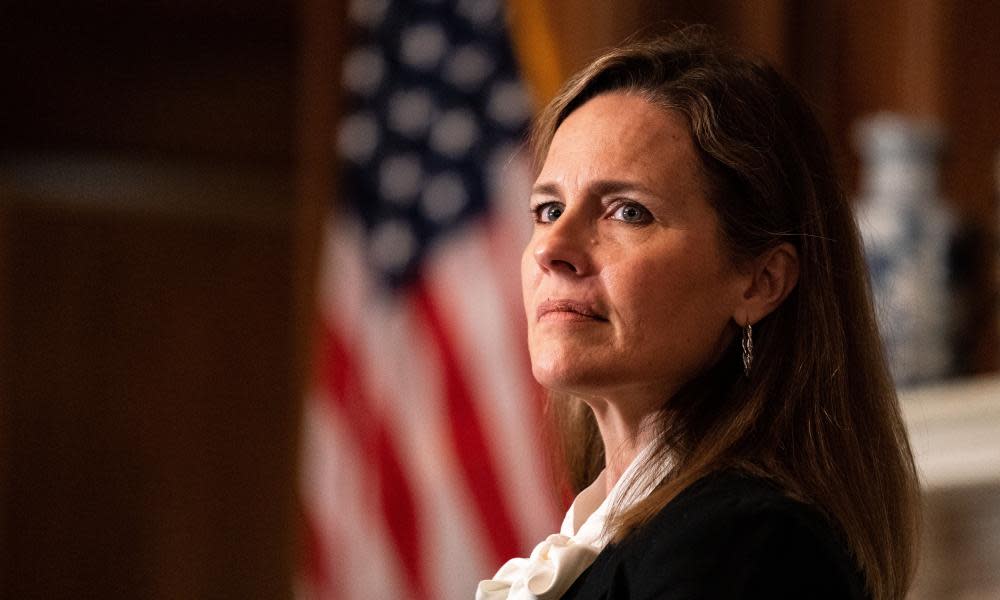'It instilled such problems': ex-member of Amy Coney Barrett's faith group speaks out
- Oops!Something went wrong.Please try again later.

Rebekah Powers was 11 when members of her faith group, the People of Praise, gathered around as she sat on a chair and laid their hands on her to pray. Powers’ sister had shown a gift for speaking in tongues, a defining trait of the followers of the small charismatic Christian community, and Rebekah was expected to do the same.
Related: McConnell hits out at Guardian and other media over Amy Coney Barrett scrutiny
But after what seemed like an eternity, she proved unable to produce a sound.
“I couldn’t get it, and I stayed there an hour and a half before they gave up and finally said, ‘You just have blockage. You need to just work on your sin and be more open,” she said.
The 41-year-old had a rebellious spirit and left People of Praise when she turned 18. It has taken decades of therapy and hard work to overcome the intense feelings of shame and fear of damnation that she said marked her childhood. The Christian faith group, based in South Bend, Indiana, dominated every aspect of her early life, she said.
Next week, Amy Coney Barrett, a conservative appellate court judge who is a prominent member of the 1,700-member strong People of Praise, will sit before the Senate judiciary committee to face questions about her judicial philosophy as part of her controversial confirmation to take a seat on the supreme court. A successful appointment, replacing the liberal Ruth Bader Ginsburg, will cement a conservative dominance on the powerful body.
Democrats have already stated that neither Barrett’s Catholic faith nor her membership in the People of Praise – which has never publicly been discussed or disclosed, but has been examined in press reports – will be raised in their questioning of the nominee.

Mitch McConnell, the Senate majority leader who is seeking to confirm Barrett before the end of October, has nevertheless said that media reports and some remarks by senators about a newly discovered public statement by Barrett in opposition to Roe v Wade, were “disgusting attacks” on faith. He said they risked a return to the “tropes of the 1960s”, when it was feared by some anti-Catholic bigots that John F Kennedy would act in the interest of the pope instead of the US.
“Our coastal elites are so disconnected from their own country that they treat religious Americans like strange animals in a menagerie,” McConnell said in a statement.
But Powers, who is one of a handful of former People of Praise members who contacted the Guardian to describe their difficult experience in the group (using her married name), and some religious scholars who have studied charismatic Christian communities, say Barrett’s membership in this specific religious community does raise legitimate questions. They want to examine how views that are integral to the group’s core beliefs – from its treatment of women to the separation of church and state – might influence her. They are also distinct from most mainstream Catholic faith.
In the bi-weekly and hours-long meetings that defined Powers’ childhood, intense prayer and discussions centered on obedience and driving out sin. Powers, who does not know Barrett, frequently witnessed people speaking in tongues and frenzied calls for evil spirits to be expelled, episodes that usually led to exorcisms.
The brainwashing and the groupthink, the female subjugation … it was so devaluing
Rebekah Powers
In the strict hierarchy exercised by the group, Powers’ parents were often asked to take in other members into their home, even though her own family were using food stamps to get by. As a child and teenager, Powers’ father served as her spiritual “head” and worked multiple jobs, including being asked to tend to the lawns of the community’s properties, free of charge.
Women who are married, like Barrett, count their husbands as their “heads”.
“We were Catholic, but the Catholicism was on the side. Our life, all of our friends, all of the randoms who were living in our household, were the [People of Praise] community. It was God,” she said. “The brainwashing and the groupthink, the female subjugation of being there to serve and listen to your spiritual head. It was so devaluing. To me, it instilled such problems.”
Powers’ experiences are in line with a handbook called The Spirit and Purpose of the People of Praise, which was obtained by the Guardian and confirms that people who seek to be members of the group are prayed with for the release of “charismatic gifts” – specifically, speaking in tongues and the gift of “prophecy”. It also states: “Obedience to authority and submission to headship are active responses to the gifts of God.”
Although Barrett has not discussed the issue, there is evidence that the former Notre Dame law professor served as a trustee for a school affiliated with the group; lived in the home of a prominent co-founder when she was in law school; and announced the birth of her children in People of Praise’s magazine, which has removed references to Barrett and her family since she joined the federal bench in 2017.
The Washington Post reported this week that Barrett served as a “handmaid” as late as 2010, a leadership position for women in the community, according to a directory.
Barrett’s father, Mike Coney, who has served in a leadership position in the People of Praise, described his own decision to join the group in a 2018 testimonial at his Catholic church, describing how he had initially unwillingly attended a charismatic seminar as a young man. “When prayed with for a greater outpouring of the Holy Spirit, nothing happened. Then later that night I began to speak in tongues. More importantly, I was filled with an insatiable appetite for reading scripture and spiritual books,” he wrote.

Thomas Csordas, an anthropology professor at the University of California San Diego who has studied the issues around communities like People of Praise, said it was wrong to focus attention on whether the group could be a considered a “cult” in the spirit of Jim Jones’s Peoples Temple. It was much more appropriate, he said, to examine what he called the “intentional community” of People of Praise and its nature of being “conservative, authoritarian, hierarchical, and patriarchal”.
“I think they’re potentially more dangerous and much more sophisticated [than a cult],” he said. “It is not the kind of group where submission of women to men means that they have to stay barefoot and pregnant. Instead, they have to be lawyers and judges and submissive to men at the same time. They have to be able to have a career and seven kids at the same time.”
Far from taking her cues from the People of Praise, Csordas said, Barrett’s biography showed she was not a “mindless devotee” of a cult, but rather part of the elite of the intentional charismatic covenant community, reflecting her previous status as a handmaiden and trustee of the school, and her father’s leadership role.
Related: Revealed: Amy Coney Barrett lived in home of secretive Christian group's co-founder
“Contrary to a situation in which people might worry she might be told what to think or told by her husband. Being that far into the community means, no, she is going to be teaching other people.” She already “knows” what to think because of the patriarchal structure she was raised in, which mirrors conservative Catholic views and the views of her judicial mentor, Antonin Scalia.
Massimo Faggioli, a professor of theology at Villanova University, said that even if senators declined to question Barrett about her faith, the issues deserved to be aired in other forums because groups like People of Praise, he said, do reject a secular view of separation between church and state.
“I don’t think we should put her Catholicism on trial, but the Catholic conservative legal movement is putting liberalism on trial. They want to change a certain understanding of the liberal order of individual rights, and that is coming from the religious worldview of Catholic groups,” he said.
“Maybe not in the Senate, but in the public square.”
A spokesman for People of Praise has said it would be inappropriate to discuss Barrett. He has also said the organization is an ecumenical community that strives to allow men and women with a “wide variety of political and religious views” to live together in harmony.

